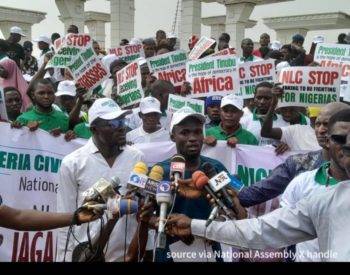In a surprising turn of events, a group of fervent young supporters of President Tinubu made their presence felt at the National Assembly, vehemently opposing the planned protests by the Nigerian Labour Congress (NLC). This display of fervor underscored the deep-seated divisions within the populace regarding the current state of affairs and the appropriate means of addressing them.
The supporters, comprising mostly youths, arrived at the National Assembly with banners and chants, passionately advocating for President Tinubu’s administration to be given a chance to rectify the country’s woes. Their stance was fueled by a belief that the new president deserves an opportunity to steer the nation in the right direction, especially considering the purported mismanagement of the previous administration under Buhari’s eight-year tenure. This sentiment was articulated as an act of patriotism, emphasizing the need for unity and support for the elected leader in the quest for national development.
Calls for Patience and Alternative Solutions Echo Amidst Growing Tensions
Amidst the fervent display of support for President Tinubu, voices advocating for patience and alternative solutions have begun to emerge, urging stakeholders to explore avenues beyond strikes and protests. The assertion that everything should not culminate in industrial actions resonates with those who seek a more nuanced approach to addressing societal challenges.
Advocates for patience argue that the complexities of governance require time to navigate effectively, especially considering the magnitude of issues inherited by the new administration. They contend that unwavering support and constructive criticism are pivotal in facilitating the president’s efforts to implement sustainable reforms and policies aimed at nation-building. Moreover, the emphasis on exploring alternative avenues underscores a growing recognition of the need for dialogue and collaboration among stakeholders to foster inclusive decision-making processes.
Striking a Balance: Navigating Dissent and National Interest
The clash of ideologies and approaches between the supporters of President Tinubu and advocates for protests highlights the delicate balance between dissent and national interest. As tensions escalate, there is a pressing need for dialogue and consensus-building to bridge the gap and chart a collective path forward.
Navigating dissent requires a commitment to fostering an inclusive environment where diverse perspectives are acknowledged and respected. It necessitates a shift towards proactive engagement and participatory governance mechanisms that prioritize the interests of all citizens. Ultimately, striking a balance between dissent and national interest is imperative in fostering a cohesive society where democratic principles thrive, and the collective well-being of the nation is upheld.
President Bola Tinubu’s Economic Reforms Bearing Fruit
Under the leadership of President Bola Ahmed Tinubu, Nigeria has witnessed significant economic reforms aimed at steering the nation towards sustainable growth and development. Among these reforms, the decision to end the petrol subsidy regime stands out prominently. Since its removal, there has been a notable decrease in petrol importation, resulting in substantial savings for the government.
Data from the National Bureau of Statistics reveals a fifty percent reduction in petrol importation, amounting to one billion liters monthly. Furthermore, crude oil production has witnessed a steady increase, reaching an average of 1.55 million barrels per day in the fourth quarter of 2023. This surge in production reflects positively on the country’s economic outlook, indicating potential revenue gains and reduced dependence on imports.
The removal of the petrol subsidy has also had a cascading effect on state finances, with monthly receipts by states from the Federal Accounts Allocation Committee (FAAC) experiencing a significant boost. This additional revenue presents an opportunity for state governments to enhance service delivery and infrastructure development, thereby improving the quality of life for millions of Nigerians. However, despite the unanimous support for the subsidy removal among major political candidates during the election campaign, there are voices of dissent emerging, questioning the decision. Such skepticism, in the face of tangible benefits, underscores the challenges of implementing bold economic reforms in a diverse and complex nation like Nigeria.
Central Bank’s Bold Steps Towards Exchange Rate Unification
In tandem with the government’s efforts to overhaul economic policies, the Central Bank of Nigeria (CBN) has embarked on a path towards a unified exchange rate system. President Tinubu’s vision for a transparent and equitable monetary policy framework has prompted the CBN to loosen its control over foreign exchange rates, allowing market forces to determine exchange rates based on the principle of ‘willing seller willing buyer.’ This move signals a departure from the previous regime of fixed exchange rates, towards a more flexible and market-driven approach.
Acknowledging the short-term challenges associated with these reforms, President Tinubu emphasizes their necessity in laying the groundwork for sustained economic growth and prosperity. While economists and experts recognize the inherent difficulties in implementing such fundamental changes, there is a consensus on their inevitability in unlocking Nigeria’s economic potential. Moreover, the CBN has taken proactive measures to enhance liquidity in the forex market, including the clearance of outstanding forex obligations and the introduction of new operational mechanisms for financial institutions and money transfer operators.
Challenges and Prospects on the Horizon
Despite the positive trajectory set by the government’s economic reforms, Nigeria still faces multifaceted challenges that require innovative and strategic solutions. The entrenched nature of these issues demands a concerted effort from all stakeholders to effect lasting change. As the government continues to navigate the complexities of economic reform, transparency, accountability, and inclusivity will be paramount in fostering public trust and confidence. Moving forward, sustained political will and a commitment to sound economic principles will be essential in realizing President Tinubu’s vision of a prosperous and resilient Nigeria.
Table of Contents
Discover more from OGM News NG
Subscribe to get the latest posts sent to your email.














